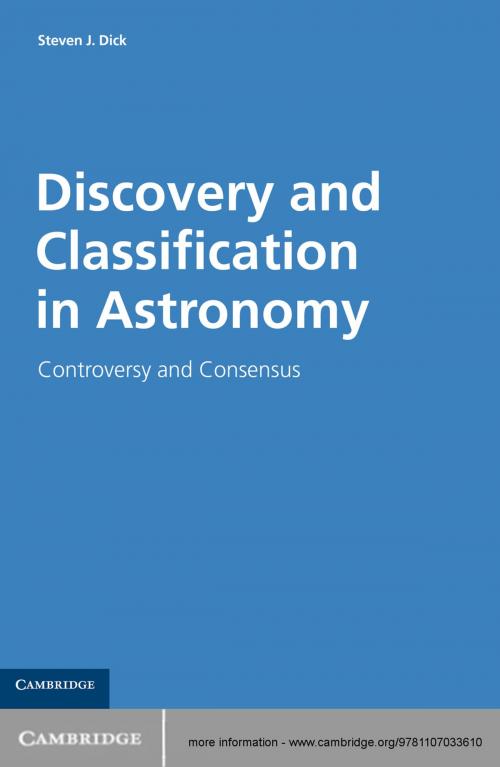Discovery and Classification in Astronomy
Controversy and Consensus
Nonfiction, Science & Nature, Science, Physics, General Physics, Mathematics| Author: | Steven J. Dick | ISBN: | 9781107272590 |
| Publisher: | Cambridge University Press | Publication: | September 9, 2013 |
| Imprint: | Cambridge University Press | Language: | English |
| Author: | Steven J. Dick |
| ISBN: | 9781107272590 |
| Publisher: | Cambridge University Press |
| Publication: | September 9, 2013 |
| Imprint: | Cambridge University Press |
| Language: | English |
Astronomical discovery involves more than detecting something previously unseen. The reclassification of Pluto as a dwarf planet in 2006, and the controversy it generated, shows that discovery is a complex and ongoing process – one comprising various stages of research, interpretation and understanding. Ranging from Galileo's observation of Jupiter's satellites, Saturn's rings and star clusters, to Herschel's nebulae and the modern discovery of quasars and pulsars, Steven J. Dick's comprehensive history identifies the concept of 'extended discovery' as the engine of progress in astronomy. The text traces more than 400 years of telescopic observation, exploring how the signal discoveries of new astronomical objects relate to and inform one another, and why controversies such as Pluto's reclassification are commonplace in the field. The volume is complete with a detailed classification system for known classes of astronomical objects, offering students, researchers and amateur observers a valuable reference and guide.
Astronomical discovery involves more than detecting something previously unseen. The reclassification of Pluto as a dwarf planet in 2006, and the controversy it generated, shows that discovery is a complex and ongoing process – one comprising various stages of research, interpretation and understanding. Ranging from Galileo's observation of Jupiter's satellites, Saturn's rings and star clusters, to Herschel's nebulae and the modern discovery of quasars and pulsars, Steven J. Dick's comprehensive history identifies the concept of 'extended discovery' as the engine of progress in astronomy. The text traces more than 400 years of telescopic observation, exploring how the signal discoveries of new astronomical objects relate to and inform one another, and why controversies such as Pluto's reclassification are commonplace in the field. The volume is complete with a detailed classification system for known classes of astronomical objects, offering students, researchers and amateur observers a valuable reference and guide.















